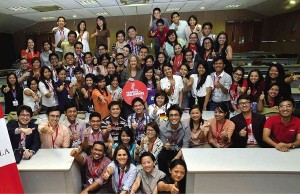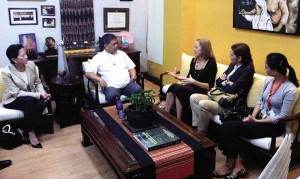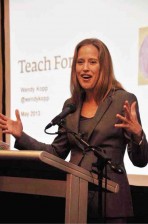Wendy Kopp and her transformational mission
Wendy Kopp is an avid runner, according to her Twitter profile.
Her running covers physical distance, which is great for her body, as well as the responsibility of leading two high-profile organizations, which is great for education not just in the United States but all over the world.
Since she founded Teach for America (TFA), Kopp has not stopped running, except perhaps to give birth to each of her four children. TFA is the organization that recruits the smartest college graduates in the US and deploys them to teach for two years in underserved public schools across the country.
Many times the running has taken on wings and brought her, as cofounder and CEO of the global network called Teach for All, to the 27 countries where the TFA model has been adopted to try and arrest a worsening gap in the education of kids from low-income families.
“I never would have thought, when I was sitting in my dorm in Princeton 23 years ago, that this work would bring me to Manila today,” said Kopp, whose recent visit marked an auspicious inaugural for Teach for the Philippines (TFP) as it readied its first corps of 53 teaching fellows for action this school year in the Grade 3 classrooms at 10 public schools in Quezon City.
Article continues after this advertisement“It is such an incredible opportunity to work together with so many people who share the same convictions and values in pursuit of something that’s so important,” Kopp told the Inquirer in an exclusive interview at the Department of Education after her courtesy call on Education Secretary Armin Luistro.
Article continues after this advertisementLeap of action
For his part, Luistro welcomed Kopp and TFP with open arms. The program, after all, is an alternate source of mentors for public schools with a short supply of classroom teachers. But more than that, Luistro saw the mission as “a first leap to action” that he was certain would mesh with the mission of his department’s half a million public school teachers.
“I am confident our pioneer batch will make a difference in the lives of young learners,” he said of the 34 women and 19 men (average age: 25) who, just before school opening, went through an intensive five-week training course at Ateneo de Manila University’s Summer Institute.
Although graduates of diverse disciplines at 22 universities abroad and in the Philippines, the TFP fellows, said Luistro, “have mastered the competencies in their areas of specialization, as evidenced by their college grades.” During the screening process, he added “they also showed extraordinary dedication, natural talent, patience and passion for mentoring young learners.”
Kopp herself said Teach for All partner countries were screening their recruits for not just academic achievement but also other qualities: “We are looking for people who persevere in the face of challenge, who can influence and motivate others, who are good problem solvers and, overall, people who are passionate and want to work relentlessly in pursuit of this particular mission.”
In every country, according to Kopp, Teach for All simply takes its cue from the initiative of social entrepreneurs like Lizzie Eder Zobel and Margarita Delgado, who cofounded TFP with Delgado’s daughter, Clarissa. This is the same team behind the highly regarded Sa Aklat Sisikat literacy program for public schools.
While here, Kopp also took the opportunity to speak to the country’s top business executives, a smart move considering TFP will have to grow its local funding support. Keynoting a recent luncheon meeting of the Makati Business Club, the Management Association of the Philippines and the Philippine Business for Education at the Manila Peninsula, she said it was a moral injustice not to give kids of poor families the kind of education that would fulfill their true potential.
It was this sense of justice that compelled Kopp to organize TFA and look for the funding to implement her undergraduate thesis at Princeton University, despite the opinion of her thesis adviser that she was deranged for proposing the aggressive recruitment of the most talented college graduates across America, regardless of academic major, to teach for at least two years at public schools in the most disadvantaged communities.
The back story to her thesis is this: “People were absolutely convinced that liberal arts graduates like myself just wanted to go get rich. We all were supposed to want to work on Wall Street. That label just didn’t strike me as right. I felt I was one of thousands of graduating seniors who were actually searching … for a way to make a real difference in the world.”
Salient lessons
In her speech before the business community, Kopp said she was optimistic about TFP’s potential to improve educational excellence and equity here because of three things she had observed on her trips to partner countries.
First, the nature of the educational inequity problem is overwhelmingly similar from place to place.
The more time you spend in classrooms in India, Columbia, China or elsewhere, Kopp said, the more you realize that the challenges facing the most marginalized students are more similar than they are different.
“They are showing up in schools that, if they are lucky—
and they’re never lucky—have the same resources but certainly not the resources to meet their extra needs,” she said. “So the solution for these kids, the kind of teachers that they need, is

ONE OF Time magazine’s 100 most influential people in the world, Kopp is in the center of this group photo with TFP fellows, staff and founders.
much more similar from place to place.”
At the school and system levels, she added, the patterns that had emerged in the policy, the practice and mindset that perpetuated the inequity were also the same.
“This means the solutions are shareable … we can move quickly, attacking this problem if we can learn from the promising efforts of others,” she said.
Second, transformational change is possible.
No one was talking about educational inequity 23 years ago, said Kopp, because the assumption was that you would have to fix poverty first to solve that problem and, since no one knew how to fix poverty, the problem was thought intractable.
“What we have seen over time is … we can provide kids who face the extra challenges of poverty with the education that will enable them to get out of poverty,” she said. She learned this through spending time in classrooms with some of TFA’s remarkable teachers, she added, and from the growing body of research into the impact of TFA that attested to this.
“Transformational” is one of Kopp’s favorite words. She talked about a transformational teacher in Northern California who was giving her students the academic tools, self-advocacy skills and leadership they would need to improve their lives. She also spoke of a transformational school in London where TFA’s counterpart, Teach First, was making great strides. She cited as an example of a transformational community the city of New Orleans where, at the onset of TFA, Grade 8 students were reading at the Grade 2 level but where today, 78 percent of the kids are graduating, a rate that is actually higher than the US national average.
Since 1990, when TFA first placed fresh college graduates to teach in the most challenging classrooms, the conversation has changed a lot, according to Kopp. “The question is no longer: Can it be done? It is now: How do we do it to scale?”
Third, leadership is at the core of the solution.
Wherever there is transformational change, said Kopp, there is transformational leadership. At the core of the solution, in addition to classroom teachers and school administrators who are purposeful, relentless and goal-oriented, is a constellation of leaders—political leaders, policymakers—who came together for the cause of education because “they had to be the ones to make things happen in their community.”
During the interview, Kopp said government leaders in many countries in the Teach for All network have made the commitment to fund some portion of the school transformation project. In Malaysia, the government foots the bill for more than half of the program. Teach for India is in partnership with the government. In the United Kingdom, government funding is about 70 percent. In the US, it is about 30 percent. Kopp, in fact, does not have to worry about the payroll as far as TFA is concerned.
“Teach for All is more of a challenge because it is hard to find the resources for a global education effort,” she added.

AT DEPED with Secretary Luistro and TFP founders (from left) Margarita Delgado, Lizzie Zobel and Clarissa Delgado
As for TFP, it is an independent nonprofit organization that relies on public and private funding, specifically from local government units, members of the Senate and multilateral agencies. Some support may be forthcoming from Teach for All, said Kopp, “because we have some global partnerships and such, but the lion’s share will have to come from individuals, companies or foundations committed to the program in the Philippines.”
It is working
When asked at what point she, as TFA founder, sat back and thought the mission was really working, Kopp replied: “Every day, even from the beginning, I guess I see evidence of both how much farther we need to go and evidence of the fact that it is working.”
No one had believed that the most sought-after college graduates would actually be willing to teach in the most hard-up communities of the US. So it was no mean accomplishment that, in its first year, TFA had 2,500 applicants and trained and fielded 500 of them.
“Very early on we started seeing that this experience was influencing the trajectory of the teachers themselves,” she said. TFA alumni were so hooked that by the program’s fifth year, they were doing things over and beyond what was expected of them. For instance, they were designing new models of teaching or spinning off schools that would be more responsive to the needs of the most disadvantaged learners.
“The fellows recruited in other countries are also having a positive impact on the kids,” she said. “And we have also seen, similarly to what we saw in the US, that this experience is transformational for the teachers themselves.”
As with any social advocacy, TFA has its set of critics, some of whom are alumni who decry their ill-preparedness for teaching the most vulnerable students in the public school system.
The five-week summer training for the TFP fellows, consisting of sessions on lesson planning, classroom management and subject content along the TFA’s Teaching as Leadership framework, does give local veteran educators cause for concern.
But perhaps the right attitude and bright disposition that Luistro had noted among the fellows do count for something. Perhaps it is the quality of the preservice training that matters, not the number of hours. In the unit planning session, for instance, the fellows were told to “teach the kids what they can take away for life.” That sounded a lot like good pedagogy.
Moreover, according to Evan Chen, the fellows will continually receive mentoring and support throughout the school year from TFP’s leadership development officers, namely, Katrina Santner, Kristalle Ortiz, Raquel Cabrieto, Michael Ramos and Mahar Mangahas. Santner is a TFA alumna. Although young and dedicated enough to be a fellow himself, Chen is instead putting his Wharton School of Economics education to good use in the program’s marketing and operations.
Kopp admitted she herself had never done active classroom teaching but that she would most likely have taught at a New York public school after college had her dreams of getting TFA off the ground fizzled.
Back to running. Kopp has not had time to pursue a graduate degree because, she said, “I’ve just been running ever since launching TFA and Teach for All, which have been an education in and of itself. This is my master’s degree.”
Many people will say that Wendy Kopp, for finding solutions to educational disparities in more places than one, has rightfully earned her Ph.D.
